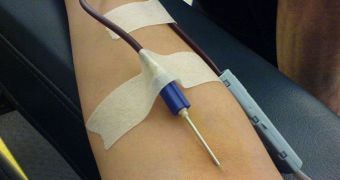Currently, people who want to give blood have to wait for certain periods of time between donations. A new study will now try to assess what is the most appropriate interval between donations. Scientists hope that this will lead to better management of blood resources.
Since there appears to be a global shortage of blood, scientists at the University of Cambridge are intent on determining whether the stuff can be harvested from willing donors more frequently than current medical practices allow.
Today, June 14, the world celebrates World Blood Donor Day, an event meant to raise awareness of blood donation, to promote blood health, and to thank unpaid volunteers who give the stuff away so that others may live.
Researchers at Cambridge, joined by colleagues at the University of Oxford and the NHS Blood and Transplant (NHSBT), will begin their landmark research this week as well. The experts say that, currently, the demand for blood and related blood-based products is on the rise.
The trend is not about to abate, since the elderly are the main consumers of such products, and the UK population is getting older at an accelerated pace. By 2050, statisticians estimate that about half of the people living in the country will be seniors.
Given these circumstances, it is becoming clear that experts need to develop a method of producing more blood. Since the number of donors does not appear to be increasing, the only thing left to do is collect more from those who are willing to help.
Before this can happen, scientists need to ensure that extracting blood more often will not make the donors sick. Assessing whether or not that is the case is the responsibility of this research collaboration.
“Limits are set for the intervals between donation frequency to minimize iron deficiency. The present inter-donation intervals in England are 12 weeks for men and 16 weeks for women, yet in Europe donation frequency can be as frequent as every eight weeks,” Dr. Carmel Moore says.
“A decisive experiment is needed to determine whether blood can safely be given more frequently by the 1.4 million people who give blood each year in England,” adds the expert, a researcher at Cambridge, and the coordinator of the trial.

 14 DAY TRIAL //
14 DAY TRIAL //